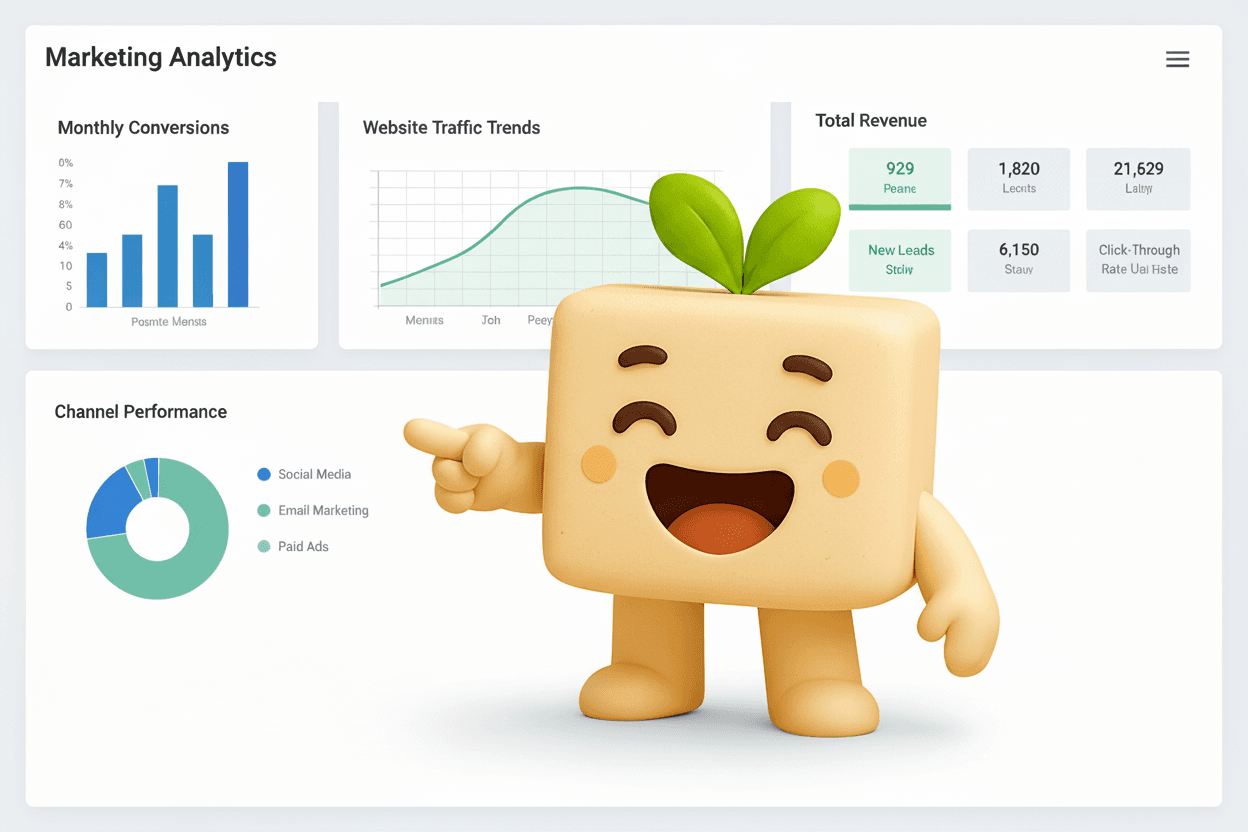Marketing analytics can feel overwhelming when you're starting out. You've got data scattered across Google Analytics, social media platforms, email tools, and ad accounts - but turning that data into actionable insights with AI marketing analytics tools? That's where most marketers get stuck.
The good news: AI marketing analytics tools have made data analysis accessible to beginners. No more wrestling with complex spreadsheets or trying to decode confusing dashboards.
Here are the best AI marketing analytics tools that'll help beginners make sense of their marketing data and actually improve campaigns.
Toffu stands out because you can literally ask questions about your marketing data in plain English. Instead of learning complicated interfaces, you simply chat with Toffu to get insights.
What it does:
- Connects to Google Analytics, Search Console, Google Ads, and social platforms
- Analyzes campaign performance and suggests improvements
- Creates automated reports and identifies trending opportunities
- Helps optimize budgets across multiple marketing channels
- Provides real-time alerts when campaigns underperform
- Suggests specific actions to improve ROI
Why beginners love it: No learning curve. Ask "Which campaigns are wasting budget?" and get a clear answer with specific recommendations.
Real example: "Toffu helped me identify that our Facebook ads were targeting the wrong audience segment, saving us $2,000/month in wasted spend." - Marketing Manager at SaaS startup
Pricing: Free plan available, paid plans start at $49/month
2. Google Analytics Intelligence
Google's built-in AI assistant lives right inside your Analytics dashboard. It surfaces automatic insights about traffic changes, conversion drops, and audience behavior.
What it does:
- Automatically detects unusual changes in your data
- Answers questions about your website traffic
- Identifies top-performing content and channels
- Suggests optimization opportunities
Best for: Website traffic analysis and conversion tracking Pricing: Free with Google Analytics
Pro tip: Combine Google Analytics Intelligence with Toffu AI to get both automated insights and actionable recommendations across all your marketing channels.
3. Facebook Ads Manager AI Features
Facebook's built-in AI tools help optimize ad performance automatically, making it easier for beginners to run successful campaigns.
What it does:
- Automatic bidding optimization
- Audience expansion recommendations
- Creative performance insights
- Budget allocation suggestions
Best for: Social media advertising optimization Pricing: Free with Facebook Ads account
Ready to see how your current campaigns stack up? Get a free marketing analysis with Toffu →
4. Google Ads Smart Campaigns
Google's simplified campaign type uses AI to automate most campaign management tasks, perfect for beginners.
What it does:
- Automatically creates ad variations
- Optimizes bidding for your goals
- Suggests relevant keywords
- Adjusts targeting based on performance
Best for: Small businesses new to Google Ads Pricing: Pay-per-click model
5. LinkedIn Campaign Manager AI
LinkedIn's built-in AI features help B2B marketers optimize their campaigns with minimal manual work.
What it does:
- Audience expansion suggestions
- Bid optimization recommendations
- Performance forecasting
- Creative insights and suggestions
Best for: B2B lead generation Pricing: Pay-per-click or impression model
6. YouTube Analytics Intelligence
YouTube's AI-powered analytics help you understand video performance and audience behavior patterns.
What it does:
- Identifies top-performing content types
- Suggests optimal upload times
- Provides audience retention insights
- Recommends content improvements
Best for: Video marketing and content creators Pricing: Free with YouTube account
Looking for more comprehensive insights across all platforms? Start your free Toffu trial →
7. Twitter Analytics AI Features
Twitter's built-in analytics use AI to surface insights about tweet performance and audience engagement.
What it does:
- Tweet performance analysis
- Audience interest insights
- Optimal posting time recommendations
- Engagement pattern identification
Best for: Social media marketing and brand awareness Pricing: Free with Twitter account
8. Pinterest Analytics Intelligence
Pinterest's AI-powered analytics help businesses understand how their content performs and what drives traffic.
What it does:
- Pin performance insights
- Audience interest analysis
- Trending topic identification
- Traffic source attribution
Best for: E-commerce and visual content marketing Pricing: Free with Pinterest Business account
9. TikTok Analytics AI
TikTok's analytics use AI to help creators and businesses understand video performance and audience behavior.
Getting Started with AI Marketing Analytics Tools
What it does:
- Video performance insights
- Audience demographic analysis
- Trend identification
- Optimal posting time suggestions
Best for: Social media marketing to younger demographics Pricing: Free with TikTok Business account
10. Google Search Console Intelligence
Google's Search Console includes AI-powered features that help you understand your website's search performance.
What it does:
- Identifies ranking opportunities
- Suggests content improvements
- Detects technical SEO issues
- Provides search trend insights
Best for: SEO optimization and organic traffic growth Pricing: Free with Google account
Want to see how all these platforms perform together? Get unified insights with Toffu →
Getting Started with Marketing Analytics AI
Step 1: Start with Free Tools
Begin with Google Analytics Intelligence and the free AI features in your existing ad platforms. This gives you a foundation without additional costs.
Step 2: Focus on One Channel First
Don't try to analyze everything at once. Pick your biggest traffic source (usually Google Ads or organic search) and master analytics for that channel first.
Best AI Marketing Analytics Tools Comparison
Step 3: Set Up Proper Tracking
AI tools are only as good as the data you feed them. Make sure you have proper conversion tracking set up across all platforms.
Step 4: Ask the Right Questions
Instead of asking "How did we do last month?", ask "Which campaigns drove the most qualified leads?" or "What content topics generate the most engagement?" Ready to transform your marketing data with AI tools? Start your free Toffu trial today →
Step 5: Consolidate Your Data
Use a tool like Toffu AI to bring all your platform data together in one place, making it easier to spot patterns and opportunities across channels.
Key Metrics to Track as a Beginner
Traffic Metrics:
- Organic traffic growth month-over-month
- Paid traffic cost per click by platform
- Social media reach and engagement rates
Conversion Metrics:
- Lead generation by traffic source
- Cost per acquisition (CPA) by channel
- Customer lifetime value (CLV)
Content Performance:
- Top-performing blog posts by traffic and conversions
- Email open and click rates
- Social media engagement rates by content type
Why Most Marketers Struggle with Analytics
The Problem: Data is scattered across 5-10 different platforms, each with its own interface and metrics. You end up spending more time collecting data than acting on insights.
The Solution: Use AI tools that can analyze data across platforms and give you actionable recommendations in plain English.
What Toffu customers say:
"Before Toffu, I spent 10 hours a week just pulling reports from different platforms. Now I get all my insights in 5 minutes." - Sarah, Digital Marketing Manager
Marketing Analytics Tool Comparison
Ready to transform your marketing data into growth? Start your free Toffu trial today →
Common Mistakes to Avoid
Start with the free AI marketing analytics tools built into your existing platforms. Once you're comfortable with those, add Toffu AI to get unified insights across all channels and actionable recommendations in plain English.
1. Focusing on Vanity Metrics
Page views and social media followers don't pay the bills. Focus on metrics tied to revenue: qualified leads, cost per acquisition, and customer lifetime value.
2. Not Setting Up Goals Properly
If your analytics tools don't know what success looks like, they can't help you achieve it. Set up conversion goals in every platform you use.
3. Analyzing Platforms in Isolation
That customer who bought after clicking your Facebook ad might have first discovered you through organic search. Use tools that show the complete customer journey across platforms.
4. Analysis Paralysis
Don't get stuck in endless reports. Pick 3-5 key metrics to focus on and check them weekly, not daily.
5. Ignoring AI Recommendations
Most platforms offer AI-powered suggestions, but many marketers ignore them. Start testing these recommendations - they're often based on millions of data points.
Advanced Tips for Beginners
Why AI Marketing Analytics Tools Matter for Beginners
Use UTM Parameters Consistently
Track which specific campaigns, emails, and content pieces drive the most valuable traffic. This helps AI tools make better optimization decisions.
Set Up Conversion Tracking Everywhere
The more conversion data your AI tools have, the better recommendations they can provide.
Test AI Suggestions
When platforms suggest bid changes, new audiences, or creative variations, test them systematically rather than ignoring them.
Consolidate Your Reporting
Use a unified dashboard tool like Toffu to see all your marketing performance in one place, making it easier to spot opportunities and issues.
Next Steps: Building Your Analytics Stack
Start with the free AI tools built into your existing marketing platforms. Once you're comfortable with those, add Toffu AI to get unified insights across all channels and actionable recommendations in plain English.
The key is consistent measurement and regular optimization based on what the data tells you. Don't let perfect be the enemy of good - start measuring something today, even if it's not perfect.
Want personalized recommendations for your marketing stack? Chat with Toffu AI about your specific analytics needs →
Why Toffu AI is Perfect for Beginners
Unlike complex analytics platforms that require training and certification, Toffu AI works like having a marketing analyst on your team who speaks plain English.
You can ask questions like:
- "Which of my campaigns are underperforming?"
- "Where should I spend more budget?"
- "What content generates the most leads?"
- "How do my competitors' ads compare to mine?"
And get answers like:
- "Your Google Ads campaign 'SaaS Demo' has a 2.3% conversion rate vs. 4.1% average. Try testing new ad copy focused on pain points rather than features."
No dashboards to learn. No complex reports to decipher. Just clear, actionable insights that help you grow.
Ready to turn your marketing data into your competitive advantage? Join 1000+ marketers using AI-powered analytics to grow faster. Start free with Toffu today →

